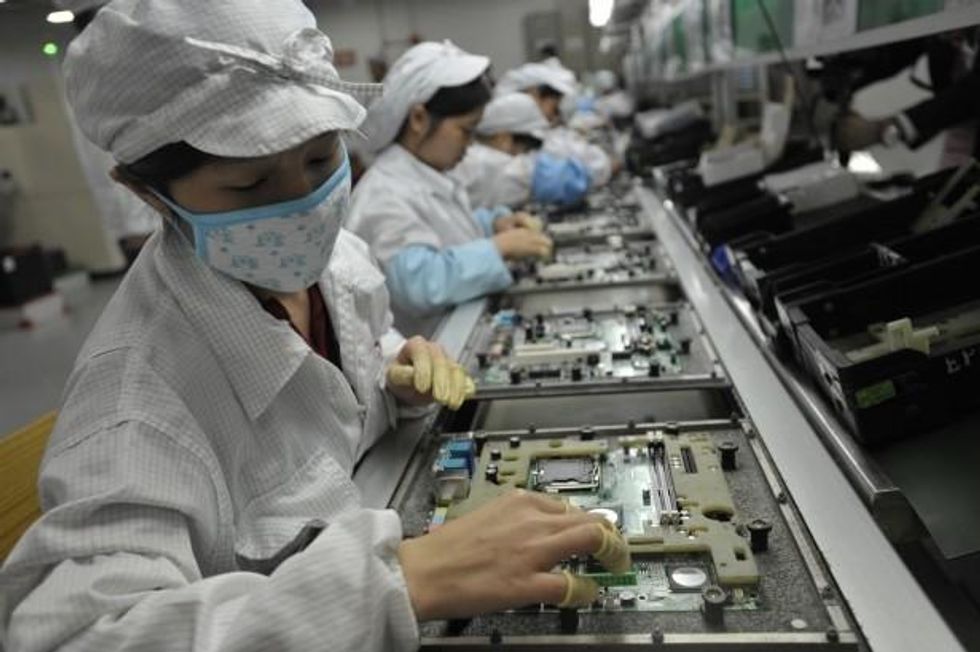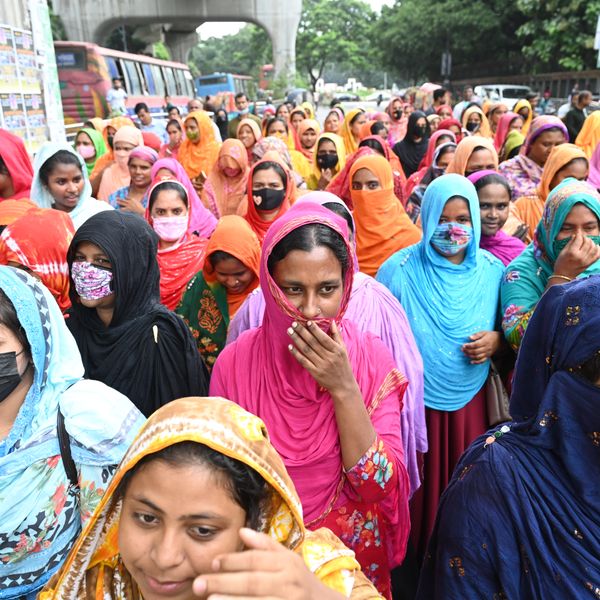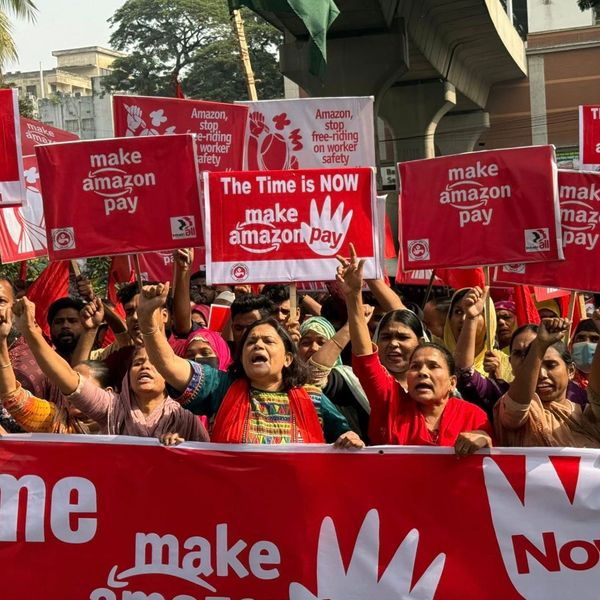Labor Activists Peer into Shadows of Apple's Factory Empire
Our gadgets and tablets make our lives easier, but those palm-sized miracles of convenience are built by hard work in a metastasizing global chain of low-wage labor. Apple has received much criticism lately over the exploitation of workers in China, particularly at the manufacturing behemoth Foxconn, where several worker suicides have stirred public outrage.

But Apple's power over China's assembly-line workforce extends to many other suppliers. A new report by China Labor Watch drills down to the lesser-known plants that piece together our hand-held devices. China Labor Watch surveyed ten factors and uncovered abuses in various aspects of production, from grinding work schedules to anemic labor protections. The findings indicate that often in these factories:
- Employers wring every last drop of labor from workers, resulting in "excessive overtime" of roughly 100 to 130 hours per month, and up to 150 to 180 hours per month during "peak production." On paper, there's a legal limit in China of 36 overtime hours per month.
- The overall basic wage is so low, compared to the local cost of living, workers have no choice but to work more hours than the legal limit, sometimes 11 hours per day, seven days a week, essentially standing in place all day except for two short meal breaks. Sometimes bosses scrimp by offering relatively small "bonuses" in lieu of the legal overtime rate.
- Workers reported "hazardous working environments," such as metal dust filling the air at one facilty.
- In some cases, employers failed to provide legally mandated social and work-injury insurance.
None of these issues are unique to Apple's supply chain, and indeed, these multinational factory jobs are seen as attractive to struggling young workers. CLW has documented poor conditions in many other multinationals operating in China. But holding Apple to account is important for setting standards across the technology sector; not only because it's an industry leader, but because it portrays itself as an emblem of "corporate social responsibility" and has recently partnered with the much-hyped Fair Labor Association to beef up its internal labor monitoring.
One of the key revelations of the CLW report is that it appears that some supplier companies have ample leeway to hide their labor practices by relying heavily on "dispatch" labor, which allows for short-term, minimally regulated work arrangements. According to the report, dispatched labor in China allows companies to prevent labor organizing, avoid having to provide severance pay to short-term workers, avoid overtime regulations and liability for worker injuries, and skirt requirements for paying social insurance for dispatched workers.
The ducking of labor regulations and standards mirrors the abuse of the "contractor" label in U.S. workplaces--a tried-and-true tactic to minimize employers' responsibilities. In China, however, workers are even more vulnerable to kind of exploitation, stuck with an opaque legal system, scrambling to avoid poverty and lacking the backing of independent unions.
Apple's production chain is replete with this kind of labor, according to CLW, which suggests that Apple may be indirectly sweeping unsavory labor practices under the rug by ignoring many of these workers in their monitoring process. "Except for Foxconn in Shenzhen which transferred all dispatched workers to direct-hire status in 2011," the report states, "all other investigated factories overused dispatched labor, including Jabil in Shenzhen where dispatched labor made up almost 70% of the workforce."
CLW argues that while Apple has seemingly invested major resources to enhance its auditing system, indirectly-hired employees remain a troubling blindspot:
Labor dispatching demands special attention because Apple does not address it in its Supplier Responsibility Progress Reports... If Apple were to take the problem into account, the number of supplier factories that meet Apple's standards would fall considerably.
Apple may for now find it more profitable to maintain a policy of willful blindness when monitoring working conditions. But it may be pushed by political shifts in China. Strikes, protests and sometimes violent clashes have been breaking out routinely across the country. In recent months, labor actions have erupted at the facilities tied to global companies like Citizen Watch, Sanyo and Panasonic.
At the same time, the Chinese government is trying to contain a rising tide of pro-democracy protest in Hong Kong. Though Hong Kong has enjoyed political autonomy from Beijing since returning to Chinese rule 15 years ago, its recent social unrest and rising economic inequality portend escalating tension between neoliberalism and social equity.
CLW's executive director Li Qiang told In These Times that since China's cheap labor costs encourage Hong Kong companies to shift capital to the mainland, "Hong Kong businessmen and companies gain extravagant benefit from this investment, and the unemployment rate in Hong Kong may be higher. Therefore, the widening disparity between the haves and the have-nots in Hong Kong may become a concern."
From Shenzhen to Hong Kong to Cupertino, vast political and social distance separates the disparate elements of this industrial regime--workers in the U.S. and relatively well-off regions in Asia seeing employers ship off to China, Chinese workers toiling at the base of the supply chain, and the consumers who absorb the products on the other end. But as everyone gradually realizes that they're all subjects of a corporate empire, the slickness of the tech industry will begin a slow-motion crash into the hard realities of the global factory floor.
An Urgent Message From Our Co-Founder
Dear Common Dreams reader, The U.S. is on a fast track to authoritarianism like nothing I've ever seen. Meanwhile, corporate news outlets are utterly capitulating to Trump, twisting their coverage to avoid drawing his ire while lining up to stuff cash in his pockets. That's why I believe that Common Dreams is doing the best and most consequential reporting that we've ever done. Our small but mighty team is a progressive reporting powerhouse, covering the news every day that the corporate media never will. Our mission has always been simple: To inform. To inspire. And to ignite change for the common good. Now here's the key piece that I want all our readers to understand: None of this would be possible without your financial support. That's not just some fundraising cliche. It's the absolute and literal truth. We don't accept corporate advertising and never will. We don't have a paywall because we don't think people should be blocked from critical news based on their ability to pay. Everything we do is funded by the donations of readers like you. Will you donate now to help power the nonprofit, independent reporting of Common Dreams? Thank you for being a vital member of our community. Together, we can keep independent journalism alive when it’s needed most. - Craig Brown, Co-founder |
Our gadgets and tablets make our lives easier, but those palm-sized miracles of convenience are built by hard work in a metastasizing global chain of low-wage labor. Apple has received much criticism lately over the exploitation of workers in China, particularly at the manufacturing behemoth Foxconn, where several worker suicides have stirred public outrage.

But Apple's power over China's assembly-line workforce extends to many other suppliers. A new report by China Labor Watch drills down to the lesser-known plants that piece together our hand-held devices. China Labor Watch surveyed ten factors and uncovered abuses in various aspects of production, from grinding work schedules to anemic labor protections. The findings indicate that often in these factories:
- Employers wring every last drop of labor from workers, resulting in "excessive overtime" of roughly 100 to 130 hours per month, and up to 150 to 180 hours per month during "peak production." On paper, there's a legal limit in China of 36 overtime hours per month.
- The overall basic wage is so low, compared to the local cost of living, workers have no choice but to work more hours than the legal limit, sometimes 11 hours per day, seven days a week, essentially standing in place all day except for two short meal breaks. Sometimes bosses scrimp by offering relatively small "bonuses" in lieu of the legal overtime rate.
- Workers reported "hazardous working environments," such as metal dust filling the air at one facilty.
- In some cases, employers failed to provide legally mandated social and work-injury insurance.
None of these issues are unique to Apple's supply chain, and indeed, these multinational factory jobs are seen as attractive to struggling young workers. CLW has documented poor conditions in many other multinationals operating in China. But holding Apple to account is important for setting standards across the technology sector; not only because it's an industry leader, but because it portrays itself as an emblem of "corporate social responsibility" and has recently partnered with the much-hyped Fair Labor Association to beef up its internal labor monitoring.
One of the key revelations of the CLW report is that it appears that some supplier companies have ample leeway to hide their labor practices by relying heavily on "dispatch" labor, which allows for short-term, minimally regulated work arrangements. According to the report, dispatched labor in China allows companies to prevent labor organizing, avoid having to provide severance pay to short-term workers, avoid overtime regulations and liability for worker injuries, and skirt requirements for paying social insurance for dispatched workers.
The ducking of labor regulations and standards mirrors the abuse of the "contractor" label in U.S. workplaces--a tried-and-true tactic to minimize employers' responsibilities. In China, however, workers are even more vulnerable to kind of exploitation, stuck with an opaque legal system, scrambling to avoid poverty and lacking the backing of independent unions.
Apple's production chain is replete with this kind of labor, according to CLW, which suggests that Apple may be indirectly sweeping unsavory labor practices under the rug by ignoring many of these workers in their monitoring process. "Except for Foxconn in Shenzhen which transferred all dispatched workers to direct-hire status in 2011," the report states, "all other investigated factories overused dispatched labor, including Jabil in Shenzhen where dispatched labor made up almost 70% of the workforce."
CLW argues that while Apple has seemingly invested major resources to enhance its auditing system, indirectly-hired employees remain a troubling blindspot:
Labor dispatching demands special attention because Apple does not address it in its Supplier Responsibility Progress Reports... If Apple were to take the problem into account, the number of supplier factories that meet Apple's standards would fall considerably.
Apple may for now find it more profitable to maintain a policy of willful blindness when monitoring working conditions. But it may be pushed by political shifts in China. Strikes, protests and sometimes violent clashes have been breaking out routinely across the country. In recent months, labor actions have erupted at the facilities tied to global companies like Citizen Watch, Sanyo and Panasonic.
At the same time, the Chinese government is trying to contain a rising tide of pro-democracy protest in Hong Kong. Though Hong Kong has enjoyed political autonomy from Beijing since returning to Chinese rule 15 years ago, its recent social unrest and rising economic inequality portend escalating tension between neoliberalism and social equity.
CLW's executive director Li Qiang told In These Times that since China's cheap labor costs encourage Hong Kong companies to shift capital to the mainland, "Hong Kong businessmen and companies gain extravagant benefit from this investment, and the unemployment rate in Hong Kong may be higher. Therefore, the widening disparity between the haves and the have-nots in Hong Kong may become a concern."
From Shenzhen to Hong Kong to Cupertino, vast political and social distance separates the disparate elements of this industrial regime--workers in the U.S. and relatively well-off regions in Asia seeing employers ship off to China, Chinese workers toiling at the base of the supply chain, and the consumers who absorb the products on the other end. But as everyone gradually realizes that they're all subjects of a corporate empire, the slickness of the tech industry will begin a slow-motion crash into the hard realities of the global factory floor.
Our gadgets and tablets make our lives easier, but those palm-sized miracles of convenience are built by hard work in a metastasizing global chain of low-wage labor. Apple has received much criticism lately over the exploitation of workers in China, particularly at the manufacturing behemoth Foxconn, where several worker suicides have stirred public outrage.

But Apple's power over China's assembly-line workforce extends to many other suppliers. A new report by China Labor Watch drills down to the lesser-known plants that piece together our hand-held devices. China Labor Watch surveyed ten factors and uncovered abuses in various aspects of production, from grinding work schedules to anemic labor protections. The findings indicate that often in these factories:
- Employers wring every last drop of labor from workers, resulting in "excessive overtime" of roughly 100 to 130 hours per month, and up to 150 to 180 hours per month during "peak production." On paper, there's a legal limit in China of 36 overtime hours per month.
- The overall basic wage is so low, compared to the local cost of living, workers have no choice but to work more hours than the legal limit, sometimes 11 hours per day, seven days a week, essentially standing in place all day except for two short meal breaks. Sometimes bosses scrimp by offering relatively small "bonuses" in lieu of the legal overtime rate.
- Workers reported "hazardous working environments," such as metal dust filling the air at one facilty.
- In some cases, employers failed to provide legally mandated social and work-injury insurance.
None of these issues are unique to Apple's supply chain, and indeed, these multinational factory jobs are seen as attractive to struggling young workers. CLW has documented poor conditions in many other multinationals operating in China. But holding Apple to account is important for setting standards across the technology sector; not only because it's an industry leader, but because it portrays itself as an emblem of "corporate social responsibility" and has recently partnered with the much-hyped Fair Labor Association to beef up its internal labor monitoring.
One of the key revelations of the CLW report is that it appears that some supplier companies have ample leeway to hide their labor practices by relying heavily on "dispatch" labor, which allows for short-term, minimally regulated work arrangements. According to the report, dispatched labor in China allows companies to prevent labor organizing, avoid having to provide severance pay to short-term workers, avoid overtime regulations and liability for worker injuries, and skirt requirements for paying social insurance for dispatched workers.
The ducking of labor regulations and standards mirrors the abuse of the "contractor" label in U.S. workplaces--a tried-and-true tactic to minimize employers' responsibilities. In China, however, workers are even more vulnerable to kind of exploitation, stuck with an opaque legal system, scrambling to avoid poverty and lacking the backing of independent unions.
Apple's production chain is replete with this kind of labor, according to CLW, which suggests that Apple may be indirectly sweeping unsavory labor practices under the rug by ignoring many of these workers in their monitoring process. "Except for Foxconn in Shenzhen which transferred all dispatched workers to direct-hire status in 2011," the report states, "all other investigated factories overused dispatched labor, including Jabil in Shenzhen where dispatched labor made up almost 70% of the workforce."
CLW argues that while Apple has seemingly invested major resources to enhance its auditing system, indirectly-hired employees remain a troubling blindspot:
Labor dispatching demands special attention because Apple does not address it in its Supplier Responsibility Progress Reports... If Apple were to take the problem into account, the number of supplier factories that meet Apple's standards would fall considerably.
Apple may for now find it more profitable to maintain a policy of willful blindness when monitoring working conditions. But it may be pushed by political shifts in China. Strikes, protests and sometimes violent clashes have been breaking out routinely across the country. In recent months, labor actions have erupted at the facilities tied to global companies like Citizen Watch, Sanyo and Panasonic.
At the same time, the Chinese government is trying to contain a rising tide of pro-democracy protest in Hong Kong. Though Hong Kong has enjoyed political autonomy from Beijing since returning to Chinese rule 15 years ago, its recent social unrest and rising economic inequality portend escalating tension between neoliberalism and social equity.
CLW's executive director Li Qiang told In These Times that since China's cheap labor costs encourage Hong Kong companies to shift capital to the mainland, "Hong Kong businessmen and companies gain extravagant benefit from this investment, and the unemployment rate in Hong Kong may be higher. Therefore, the widening disparity between the haves and the have-nots in Hong Kong may become a concern."
From Shenzhen to Hong Kong to Cupertino, vast political and social distance separates the disparate elements of this industrial regime--workers in the U.S. and relatively well-off regions in Asia seeing employers ship off to China, Chinese workers toiling at the base of the supply chain, and the consumers who absorb the products on the other end. But as everyone gradually realizes that they're all subjects of a corporate empire, the slickness of the tech industry will begin a slow-motion crash into the hard realities of the global factory floor.

